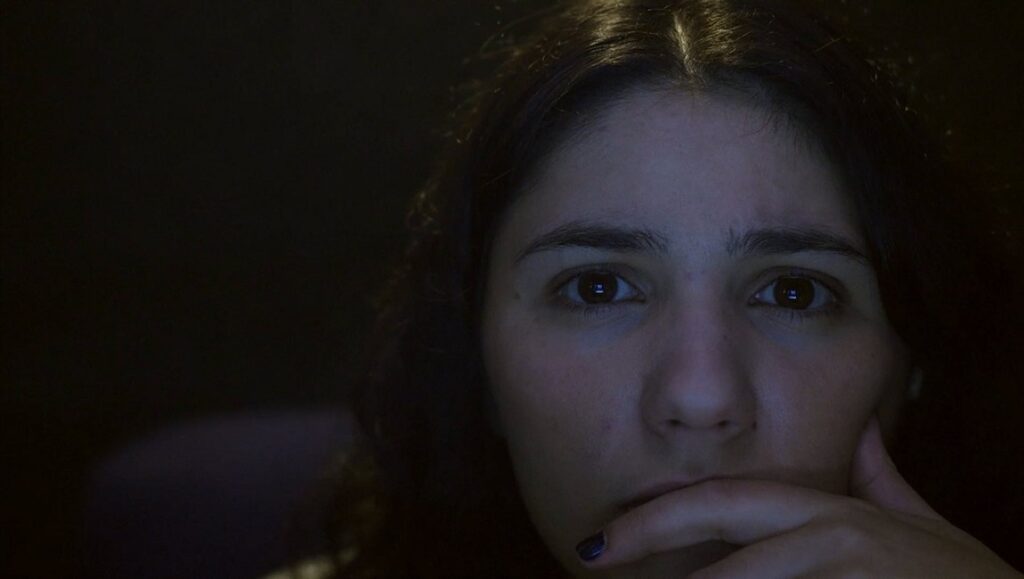Lacking much in the way of an explored thesis, The Viewing Booth only musters the power of a gimmick.
Talking about the patent-pending Interrotron in a 2004 issue of FLM Magazine, documentarian Errol Morris touts his teleprompter-inspired camera appendage as a tool that “creates greater distance and greater intimacy.” Tired of keeping his head directly next to the camera for prolonged interviews, but still fascinated by the ways in which eye contact is made obvious by the camera, Morris put a live video feed of his own face next to the lens, which (according to his production designer Ted Bafaloukos) capitalized upon what subjects “…do best. Watch television.” It’s not just what the interviewee says, but how they deliver it, eye contact or lack thereof, and other subtle inflections that become more pronounced while in the presence of directorial authority as one tries to exert their own.
In The Viewing Booth, Ra’anan Alexandrowicz not only attempts a feat similar to the Interrotron, but strives to position the eponymous documentary device as the nucleus of his newest film, the opening minutes dedicated to what are presumably the director’s hands assembling a camera, his voice on the soundtrack invoking Virginia Woolf’s response to questions of the Spanish Civil War, and humanity’s propensity for bloodshed in general. Ra’anan — via Woolf — calls into question the impact of the “image,” how varying conclusions can be deduced from a single, documented instance; the author also interrogated the employment of the royal we, because how are we unified in aspired peace if we see differently? Within the booth, then, is a screen below the camera, to present the participant with images to comment upon, the means of documentation inextricable from even the most minute formal facets of The Viewing Booth. Whereas Morris and innumerable other documentarians still pivot cleanly from interviews to archival footage, Alexandrowicz combines the two, his documentary subsequently working in real time.
Thus begins Alexandrowicz’s 70-minute experiment, where he invites an Israeli-American student, Maia, into the viewing booth, presenting the pro-Israel woman with videos of violence inflicted upon the Palestinian people by their oppressors, the reactions of the subject maintained in tandem with the videos on the screen. Maia occasionally appears to have her preconceived ideas about the nonexistent tolerance of Israel thrown into question, but always conveniently back peddles, her defense often returning to notions of performance. She remains mostly subservient (“this looks bad for Israel” she says, as if such sanctity is more of a concern than the actual atrocities she’s witnessing), wondering aloud how these events can be as awful as they appear if someone is present to film them. Alexandrowicz pushes back — he’ll cut to his end of the apparatus, replete with multiple monitors and a microphone — although Maia remains steadfast.
It’s difficult to gauge how worthwhile an endeavor The Viewing Booth is in yet another year of well-documented, unfettered Israeli aggression and prejudice, its release otherwise delayed due to the pandemic following its Berlinale programming in early 2020. Alexandrowicz, who is Israeli himself, has made documentaries highlighting the oppression experienced by Palestine before, but when applied to The Viewing Booth’s loftier, more exploratory countenance, the conflict is furtively — and in effect, superficially — “topical.” As misinformation campaigns continue to proliferate, employing racism and all sorts of Zionist jargon, why should the ontology of the image be so worthlessly dissected? Alexandrowicz and Maia stumble upon impasse after impasse, and as such, Woolf’s source quote is lazily confirmed, nevermind that the essay that houses this idea, “Thoughts on Peace in An Air Raid,” although fitfully problematic in of itself, is more artistically committed to its thesis than The Viewing Booth is to…well, whatever it achieves as filmed study. Knowing that, despite a few chinks in her nationalistic armor, Maia is mostly unswayed renders the film ultimately superfluous. Prominent music journalists are on Fox News comparing fart jokes to pogroms and sites of worship are ruthlessly destroyed; watching a young person watch these atrocities has about as much power as a Now This video posted by a relative on Facebook.


Comments are closed.